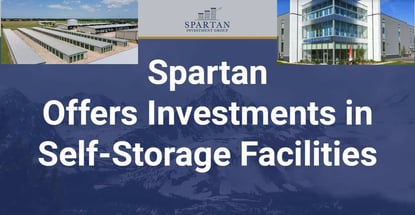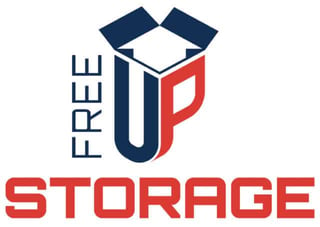
Our experts and industry insiders blog the latest news, studies and current events from inside the credit card industry. Our articles follow strict editorial guidelines.
In a Nutshell: Real estate has many advantages as an investment class, but one segment — self-storage — stands as the best-performing and the most resistant to recession. Spartan Investment Group offers accredited investors a seamless approach to getting into self-storage through a Growth Fund focused on ground-up construction and an Income Fund designed to produce monthly cash flow. Vertically organized Spartan manages every aspect of the investment, from acquisition to syndication, development, and management. Its strong track record of success has generated a large community of investors interested in diversifying through self-storage.
Self-storage is in demand because life happens, and people need places to put things. As the COVID-19 pandemic recedes, that’s the essence behind the continued growth and headline-generating consolidations in the self-storage industry.
It’s a manifestation of US economic dynamism that spurs the job transitions, relocations, downsizing decisions, and home renovations that increase demand for self-storage.
Spartan Investment Group welcomes accredited investors interested in generating lasting passive income from the continuing surge in self-storage. Spartan started in the residential development space in 2013 but began transitioning to the commercial side, specifically self-storage, around 2016, because of the sector’s historical upside.

As of spring 2023, a team of more than 130 at Spartan manages a portfolio of about 70 properties and $600 million in assets. The company is vertically integrated and capable of overseeing every aspect of an investment, from acquisition to ongoing management. It includes an in-house construction management firm, Spartan Construction Management, and a national self-storage brand, FreeUP Storage.
Spartan opportunities for 2023 include a Growth Fund that targets new construction in markets with demonstrated potential. An Income Fund targets existing value-add facilities that can generate consistent monthly cash flow for investors.
Another fund for 2023, the Debt Fund, welcomed accredited investors to invest in Spartan notes. Although the Debt Fun recently closed, the Growth and Income Funds remain open to investors as of spring 2023.
“We have a network of well over 1,800 active investors now, and we identify value-add and opportunistic self-storage investments throughout the country,” said Ryan Gibson, President and CIO at Spartan. “Americans are on the move more than in other parts of the world, and self-storage has become a big industry.”
A Hyperlocal, Research-Based Approach to Real Estate
When Gibson and his co-founder, CEO Scott Lewis, decided to invest in commercial real estate through Spartan, they established decision-making criteria they called the three Es to govern their choice. Self-storage quickly rose to the top.
“We wanted properties that were easy to own, easy to evict, and easy to maintain,” Gibson said. “That eliminated a lot of high-touch sectors, such as assisted living or restaurants.”

Sealing the deal was self-storage’s historical imperviousness to financial crisis. Data shows that self-storage occupancy held firm during the stock disruptions of the past few decades, including Black Monday in 1987, the dot-com bubble of 2000, and the Great Recession of 2008.
Self-storage also tends to be recession resistant, with occupancies holding consistent during the last four dips in GDP. More recently, during the COVID-19 pandemic, self-storage went on a boom.
Spartan’s investment thesis is to find properties that are 40,000 square feet or larger in secondary and tertiary markets with value-add or opportunistic potential. Target facilities are typically mom-and-pop shops where the proprietors want to retire and sell.
Spartan also employs a hyperlocal demographic approach to boil down potential target markets from 4,500 to approximately 150, looking at rental rates, population growth, median household income, major economic drivers, and market occupancy.
“It’s important to know that storage is a three-mile market like retail — you’re not really going to know your market until you have a street address,” Gibson said.
Because Spartan also builds from the ground up, it also wants to ensure rents are at least $18 to $20 per square foot annually to justify the economics of construction costs.
“That eliminates a lot of markets for ground-up development,” Gibson said. “Overall, if we get a deal that doesn’t fit inside the box as far as markets go, we know we can say no.”
Acclimating New Investors to the Asset Class
For ground-up new construction, the Growth Fund offers investors the highest return and the best upside, but it also presents the most risk.
“We’re buying raw land, we’re having it entitled, we’re building a facility, we’re leasing it up,” Gibson said.
The Income Fund is for investors who need that monthly cash flow. Both closed-end funds carry a $50,000 minimum investment and a target hold period of about five years.

Spartan provides a learning portal to educate investors about self-storage, market trends, Spartan’s acquisition criteria, and its extensive due-diligence process.
Spartan’s YouTube channel includes playlists devoted to its 2023 funds, property tours, webinars, and many investment specifics. A three-part series on how Spartan builds self-storage has a camera on a job site filming what’s happening, what it costs, how long it takes, and the permit process.
“I’ve created a masterclass in self-storage that literally goes down to the studs with me walking properties and pointing things out and explaining and going into underwriting and due diligence,” Gibson said.
The Spartan website also houses a blog, the Spartan Newsroom, which acts as a news and information hub for passive investing in self-storage. An extensive FAQ section handles everything from defining an accredited investor to investment details, tax implications, and Spartan’s approach to investing.
There’s even a glossary to help users navigate the sometimes arcane terminology inherent in private investing. The team also produces content for industry publications and offers a mailing list to update investors about company events and point users to new content.
“We provide a lot of content and give a lot of value with the education we put out there,” Gibson said.
A Proven Source of Value-Add and Opportunistic Deals
Spartan’s story is one of GRITT: growth, respect, integrity, tenacity, and transparency. A mission to improve lives through investing drives the Spartan team to leave no stone unturned in finding the best value-add and opportunistic deals for its tribe of investors.
Scott Lewis, Spartan’s co-founder, is a former US Army infantry officer. He’s also an active reservist and an Iraqi Freedom combat vet. Those experiences influenced Lewis and the Spartan team to use military strategic decision-making processes to execute its mission.
To evaluate deals, Spartan maintains an acquisition team to go into the market to look at properties and underwrite them. When the team is ready to go to contract, an internal investor team that includes Lewis, Gibson, and three executive partners votes on the decision.
Putting a deal under contract requires a full-blown review with a prospectus by the acquisitions team that includes standard underwriting processes, standard summaries of the investment, questions answered in advance, and a deal-review presentation.
After contracting the deal, Spartan then applies a 700-point due-diligence checklist, with a team responsible for various components of the agreement. Spartan also undertakes a feasibility study on every deal to understand demographics, saturation, and market data.
Meanwhile, Spartan continues to investigate new opportunities. It introduced a new vehicle, the Delaware Statutory Trust (DST), in June 2023 for investors using Section 1031 of the Internal Revenue Code.
Unlike a tenant-in-common agreement structure, the 1031 structure allows multiple investors to pool their funds. They own the deal outright with their beneficial interests, but then it gives them access to institutional-quality investments that their 1031 proceeds wouldn’t necessarily have allowed them to access.
The DST structure is ideal for active property owners looking for a tax-deferred method of transforming those assets into passive income.
“Perhaps the investor held real estate assets for a long time, but they’re retiring and want a good, stabilized, cash-flowing investment,” Gibson said. “It’s a great opportunity for tax deferral or estate planning.”



![7 Best High-Limit Credit Cards for Fair Credit ([updated_month_year]) 7 Best High-Limit Credit Cards for Fair Credit ([updated_month_year])](https://www.cardrates.com/images/uploads/2017/11/fair-credit-limits-art.jpg?width=158&height=120&fit=crop)
![12 Best Credit Cards to Transfer High Balances ([updated_month_year]) 12 Best Credit Cards to Transfer High Balances ([updated_month_year])](https://www.cardrates.com/images/uploads/2019/05/best-credit-cards-for-transferring-high-balances-feat.jpg?width=158&height=120&fit=crop)
![9 Best Credit Cards for High Credit Scores ([updated_month_year]) 9 Best Credit Cards for High Credit Scores ([updated_month_year])](https://www.cardrates.com/images/uploads/2019/10/Best-Credit-Cards-for-High-Credit-Scores-Feat.jpg?width=158&height=120&fit=crop)
![12 Best Credit Cards for High Spenders ([updated_month_year]) 12 Best Credit Cards for High Spenders ([updated_month_year])](https://www.cardrates.com/images/uploads/2019/10/Best-Credit-Cards-for-High-Spenders-Feat.jpg?width=158&height=120&fit=crop)
![7 Balance Transfer Cards With High Limits ([updated_month_year]) 7 Balance Transfer Cards With High Limits ([updated_month_year])](https://www.cardrates.com/images/uploads/2021/06/Balance-Transfer-Cards-With-High-Limits.jpg?width=158&height=120&fit=crop)
![5 High-Limit Secured Credit Cards ([updated_month_year]) 5 High-Limit Secured Credit Cards ([updated_month_year])](https://www.cardrates.com/images/uploads/2023/05/High-Limit-Secured-Credit-Cards.jpg?width=158&height=120&fit=crop)
![9 High-Limit Business Credit Cards ([updated_month_year]) 9 High-Limit Business Credit Cards ([updated_month_year])](https://www.cardrates.com/images/uploads/2023/06/High-Limit-Business-Credit-Cards.png?width=158&height=120&fit=crop)